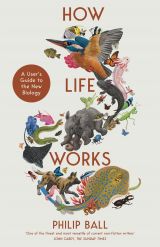How Life Works: A User’s Guide to the New Biology

|
vyprodáno |
|
Internetová cena:
|
439,00 Kč 
|
|
Běžná cena:
|
549,00 Kč |
|
Zboží není skladem
|
A cutting-edge new vision of biology that proposes to revise our concept of what life is – from Science Book Prize winner and former Nature editor Philip Ball.
Biology is undergoing a quiet but profound transformation. Several aspects of the standard picture of how life works have been exposed as incomplete, misleading, or wrong.
In How Life Works, Philip Ball explores the new biology, revealing life to be a far richer, more ingenious affair than we had guessed. With this knowledge come new possibilities. Today we can redesign and reconfigure living systems, tissues, and organisms. We can reprogram cells, for instance, to carry out new tasks and grow into structures not seen in the natural world. Some researchers believe that ultimately we will be able to regenerate limbs and organs, and perhaps even create new life forms that evolution has never imagined.
Incorporating the latest research and insights, How Life Works is a sweeping journey into this new frontier of the nature of life, a realm that will reshape our understanding of life as we know it. Review Ball’s marvelous book is both wide-ranging and deep . . . How Life Works has exciting implications for the future of the science of biology itself. I could not put it down. -- Siddhartha Mukherjee, author of The Emperor of All Maladies, winner of the Pulitzer Prize for Non-Fiction
Ball takes glee in tearing down scientific shibboleths . . . and his penetrating analysis underscores the stakes of outdated assumptions. . . . Provocative and profound, this has the power to change how readers understand life’s most basic mechanisms. ― Publishers Weekly
Ball has the rare ability to explain scientific concepts across very diverse disciplines. . . . He explains the turn away from a purely mechanical view of life to one that embraces the inherently dynamic, complex, multilayered, interactive, and cognitive nature of the processes by which life sustains and regenerates itself. -- James Shapiro, author of Evolution
Offers a much-needed examination of exciting, cutting-edge findings in contemporary biology that is likely to dramatically transform our understanding of living systems -- Daniel J. Nicholson, coeditor of Everything Flows
In showing that complex life is more 'emergent' than 'programmed,' Ball takes on many conventional notions about biology. 'We are at the beginning of a profound rethinking of how life works,' he writes. Evolution has consistently invented new ways of creating living beings, and it will continue to do so. 'The challenge,' writes the author, 'is to find a good way of talking about these vital stratagems,' and his latest book offers plenty of food for thought for scientists in disciplines from medicine to engineering. A bold effort to create a new language that forces a 'rethinking' of 'thinking itself.' ― Kirkus Reviews, starred review About the Author Philip Ballis a freelance writer and broadcaster, and was an editor at Nature for more than twenty years. He writes regularly in the scientific and popular media and has written many books on the interactions of the sciences, the arts, and wider culture, including H2O: A Biography of Water, Bright Earth: The Invention of Colour, The Music Instinct, and Curiosity: How Science Became Interested in Everything. His book Critical Mass won the 2005 Aventis Prize for Science Books. Ball is also a presenter of Science Stories, the BBC Radio 4 series on the history of science. He trained as a chemist at the University of Oxford and as a physicist at the University of Bristol. He is the author of The Modern Myths. He lives in London.
Další knihy od tohoto autora
Diskuze
Žádný příspěvek do diskuze. Přidejte svůj názor »
|











